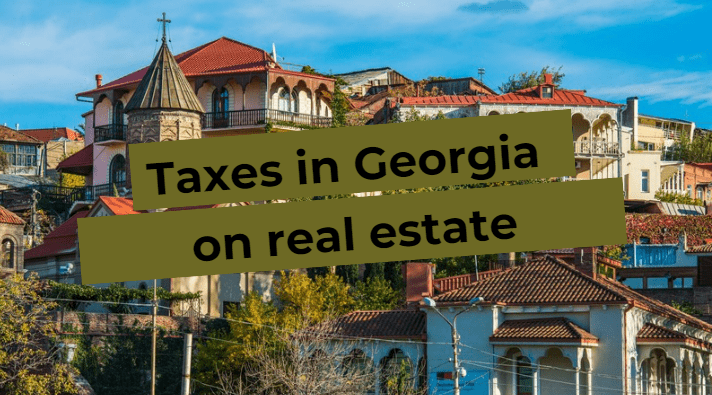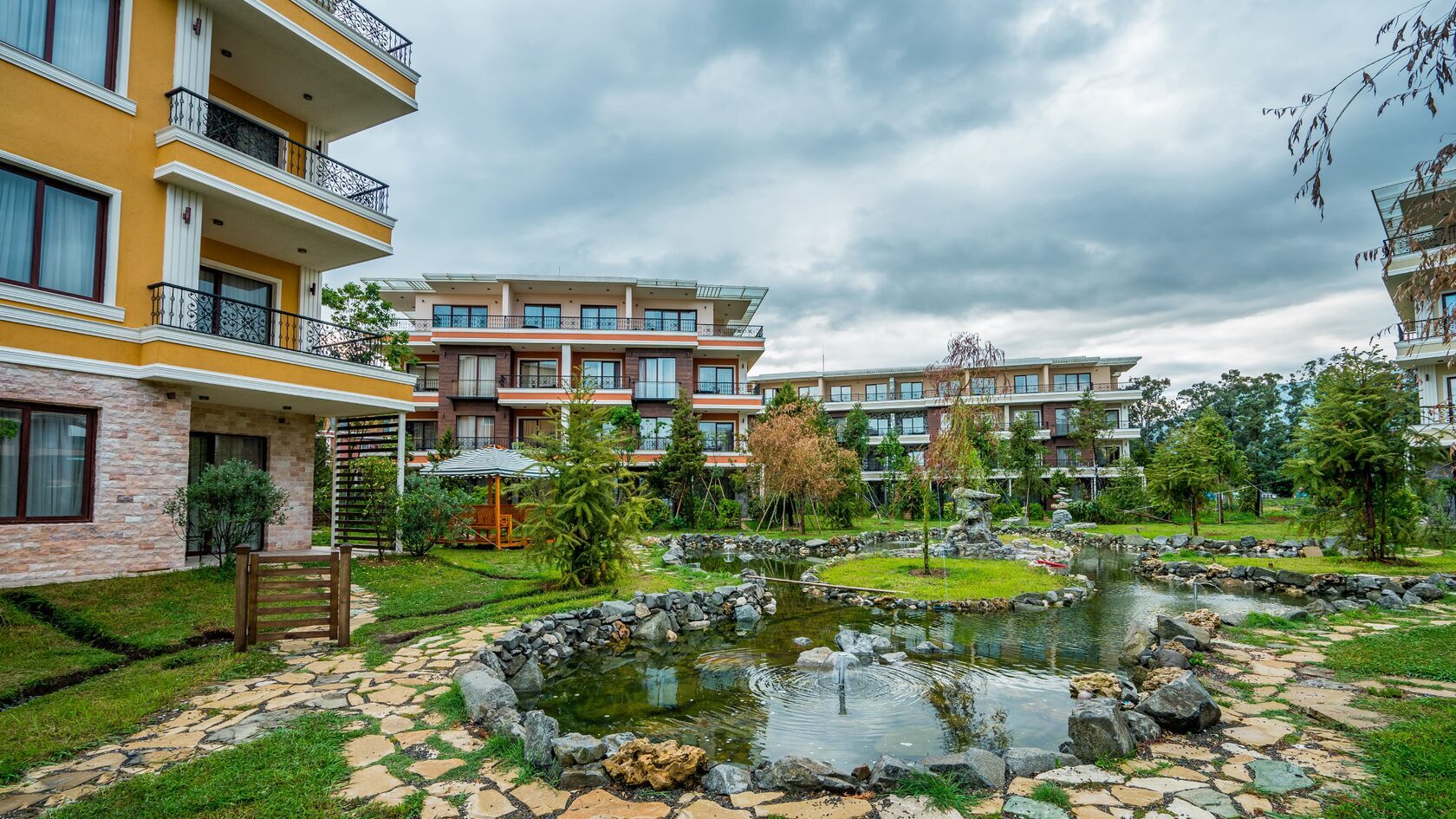
Real estate taxes in Georgia


of Georgia
Introduction to the topic "Real Estate Taxes in Georgia" opens new horizons for investors and real estate owners. Georgia, a country with an emerging real estate market and attractive tax policy, offers unique business opportunities. In this article, we will cover the basic aspects of property taxation, including property tax, Georgia VAT, property income tax and real estate tax incentives. We will also discuss the legal aspects of property ownership by foreigners and provide useful advice from experts.
A brief overview of owning real estate in Georgia
Georgia attracts investors with its liberal economic laws and ease of doing business. Real estate ownership in Georgia is open to both locals and foreigners, making it a popular choice for international real estate investment. The country offers a variety of real estate types, from urban apartments in Tbilisi to picturesque villas on the coastline Black Sea.
In Georgia, special attention is paid to the development of infrastructure and the tourism industry, which contributes to the increase of the of real estate values and makes investments even more attractive. The government actively supports foreign investment through various programs, including granting residency when purchasing real estate for a certain amount. This not only simplifies the process of buying and owning real estate, but also provides foreign investors with additional benefits such as easy access to visas and the possibility of obtaining citizenship.
Moreover, Georgia offers relatively low property tax rates and no global income tax for foreign residents, making it one of the most desirable destinations for buying real estate. These factors, combined with beautiful nature and rich culture, create an ideal environment for living and investing.
Thus, Georgia not only provides a wide range of opportunities for real estate investment, but also provides favorable conditions for international investors and expats seeking efficient investment and comfortable living.
Overview of real estate taxes in Georgia
Georgia is known for its simple and transparent tax system. Property tax here is relatively low and depends on the location and type of property. This makes Georgia attractive to investors looking for efficient tax planning. In addition, Georgia offers additional tax incentives to encourage investment in certain regions and sectors of the economy, which may include special real estate tax conditions in investment zones or for commercial properties that promote economic development.
Real estate taxation in Georgia is divided into several categories, each with its own rates: - Residential properties is generally taxed at a rate from 0.05% to 0.2% of the cadastral value of the property. - Commercial real estate may be taxed at a higher rate, up to 1% of the cadastral value, depending on the location and use of the object. - Land plots are also subject to taxation, and rates may vary depending on their location and intended use.
One of the features of Georgia's tax system is the absence of inheritance and gift tax on real estate, which makes transferring real estate easier and less costly than in many other countries. There is also no capital gains tax for individuals in Georgia, which makes real estate investments even more attractive.
Explanation of the property tax system
Property tax in Georgia is levied on property owners and is calculated based on the cadastral value of the property. Tax rates can range from 0.05% to 1%, which is one of the lowest rates in the region. It is important to note that the cadastral value is often lower than the market value, which further reduces the tax burden.
- Determination of cadastral value: Cadastral value is determined on the basis of an appraisal carried out by government authorities and may be revised every few years to reflect changes in the real estate market.
- Specific tax rates for different types of propertyFor example, commercial real estate may be taxed at a higher rate than residential real estate. There may also be different rates for land plots, depending on their location and use.

- Benefits and exemptions: Certain categories of property may be exempt from property tax or have reduced rates. For example, state and public institutions and religious organizations often enjoy such exemptions.
- Impact on investment attractiveness: Low property tax rates make the Georgia as an attractive investment destination in real estate, which contributes to the inflow of foreign investment and the development of the country's economy.
- Tax payment procedure: Property tax is generally payable annually. Property owners must independently file the relevant declarations with the tax authorities and pay the tax by the due dates.
A detailed guide to real estate tax
Who should pay and how much?
All property owners in Georgia are required to pay property tax. The tax rate depends on the type and location of the property. For example, residential properties in large cities such as Tbilisi or Batumi may have a higher rate than rural properties. However, it is important to note the following aspects:
- Minimum tax rate is 0.05% and the maximum is 1% of the cadastral value of the property.
- Cadastral value is determined based on the assessment of local tax authorities and may differ significantly from the market value.
- Special rates may apply to commercial properties or properties of special economic or cultural value.
- Benefits may be granted for certain categories of the population, such as pensioners, large families or disabled persons, as well as for real estate used in the agricultural sector or for socially important projects.
Understanding these nuances helps property owners optimize their tax liability and plan their finances more efficiently. It is always advisable to consult with a tax attorney or professional to ensure that calculations are correct and that all possible tax benefits are utilized.
Income tax on profits from rental and sale of real estate
Real estate rental income in Georgia is also subject to taxation. The tax rate is 5% of the amount of income. When selling real estate, the income tax depends on the period of ownership of the property and may vary. If andIncome from rental real estate in Georgia is taxable and the tax rate is 5% on the amount of income. This means that owners who rent out their property must pay 5% of tax on the rental payments received. This rate is fixed and does not depend on the amount of income, which makes tax planning more predictable for owners.
When real estate is sold, income tax also depends on the period of ownership of the property. If the property has been owned for less than two years, the tax will be 20%. This is intended to deter speculative purchases and quick resale of the property. If, however, the property has been owned for more than two years, the tax is reduced to 5%. This encourages long-term investment in real estate and helps stabilize the market.

In addition, it is worth noting that various costs associated with owning and improving the property, such as the cost of repairs, improvements, and other investments in the property, can be taken into account when calculating income tax on the sale of real estate, which can significantly reduce the tax base.
It is also important to remember that special tax rules may apply for foreign citizens who are not tax residents of Georgia, depending on bilateral tax treaties between Georgia and the country of residence of the investor. This may affect tax rates and conditions, so consulting with a tax specialist becomes extremely important for optimizing the tax rates and conditions.
Implications of Value Added Tax (VAT) in real estate transactions
Value Added Tax (VAT) in Georgia is 18% and applies to most goods and services, including real estate transactions. However, there are certain exceptions and conditions under which VAT may be reduced or not charged at all:
- Primary sale of residential real estate exempt from VAT.
- Real estate resale is subject to VAT if the seller is engaged in commercial activities for the sale of real estate.
- Commercial real estate: When buying commercial real estate, VAT can also be applied, but if the buyer is registered as a VAT payer, he can claim a refund of the tax paid. This reduces the final purchase price and makes the investment more attractive.

- Leasing: Where a property owner is engaged in renting out property and is registered as a VAT payer, rental payments are also subject to VAT. However, this allows the owner to reduce the tax base by the amount of VAT paid on operating expenses related to the lease.
- Construction: In the case of real estate construction for sale or commercial use, VAT is applied to the cost of construction materials and services. This increases initial costs, but also allows developers to obtain VAT refunds, which reduces the overall financial burden.
These details indicate that dealing with VAT in Georgia requires careful planning and understanding of current tax laws. Property owners and investors are advised to work with qualified tax advisors to optimize their tax liabilities and maximize the benefits of their real estate investments. This is particularly important in the context of Georgia, where the tax system offers
Tax benefits for long-term owners of real estate
Owning real estate in Georgia for more than two years opens the door to tax benefits, especially when selling the property. If you have owned the property for more than two years, the capital gains tax on the sale will be only 5%, as opposed to 20% for shorter ownership periods. This encourages investors to make long-term investments in Georgian real estate.
Additionally, owners who are actively involved in improving their property or investing in renovations and modernization may qualify for additional tax deductions. These deductions may include the costs of construction and renovation work that is aimed at improving the energy efficiency of a building or adapting it to modern safety standards.

In addition, to stimulate the development of certain regions of Georgia, the government may offer special tax incentives for investors acquiring and rehabilitating real estate in these zones. These incentives may include full exemption from property tax for a certain period of time or a significant reduction in tax rates.
These measures not only make Georgia attractive for long-term real estate investments, but also contribute to the improvement of the quality of the housing stock and the development of local infrastructure. Investors who plan their investments with these incentives in mind can significantly increase the profitability of their investments and contribute to the sustainable development of Georgia's regions.
Case studies
To better understand how tax rules are applied in practice, let's look at a few case studies:
Investor from Europe acquired apartments in Tbilisi for short-term rentals. Once the business is registered, rental income is taxed at 5%. Due to the efficient tax structure and high utilization of accommodation through tourism platforms, the investment paid off in 3 years. This case study shows how proper utilization of Georgia's tax code can lead to a high return on investment, especially in the short-term rental sector, which is popular among tourists.
A family from Russia bought a house on the Black Sea coast. Using the house for personal use and not renting it out, they pay only property tax, which is about 0.1% of the cadastral value of the house per year. This example illustrates the benefits of a low property tax rate for owners using the property for personal use, making Georgia attractive to foreign buyers wishing to own a second home or vacation spot.

American businessman acquired an office building in the center of Tbilisi. The seller was engaged in commercial activities and therefore VAT was applicable to the transaction. However, as the buyer continued to use the building for commercial purposes, he was able to exercise the right to deduct VAT. This case highlights the importance of understanding tax liabilities and deduction opportunities in Georgia, which can significantly reduce the overall cost of
These examples demonstrate how different aspects of Georgia's tax system can influence the decisions of foreign investors.
Investing in real estate in Georgia offers many advantages, including low tax rates and a simple tax system. However, to maximize benefits and minimize risks, it is important to have a thorough understanding of local laws and regulations. By utilizing the services of professionals and carefully studying the market, investors can successfully implement their projects and ensure a high return on investment in Georgian real estate.
For more information and advice, contact our real estate and tax experts who can help you make choices and navigate Georgia's tax system.
Property tax rates in Georgia range from 0.05% to 1% of the cadastral value, depending on the type and location of the property.
Yes, foreigners can own real estate in Georgia without any restrictions.
The required documents usually include proof of ownership, cadastral valuation and identity documents.
No, Georgia does not impose capital gains tax on individuals in real estate transactions.
Yes, real estate owned for more than two years is subject to reduced capital gains tax rates on sales.
Cadastral value is determined by a state appraisal based on factors such as location, size and type of real estate.
Rental income is taxed at a flat rate of 5%.
VAT of 18% applies to certain real estate transactions, but the initial sale of residential property is exempt from the tax.
What are the property tax rates in Georgia?
Property tax rates in Georgia range from 0.05% to 1% of the cadastral value, depending on the type and location of the property.
Are foreigners allowed to own real estate in Georgia?
Yes, foreigners can own real estate in Georgia without any restrictions.
What documents are required to pay property tax in Georgia?
The required documents usually include proof of ownership, cadastral valuation and identity documents.
Is capital gains tax levied on real estate in Georgia?
No, Georgia does not impose capital gains tax on individuals in real estate transactions.
Are there any tax benefits for long-term property owners in Georgia?
Yes, real estate owned for more than two years is subject to reduced capital gains tax rates on sales.
How is the cadastral value of real estate determined?
Cadastral value is determined by a state appraisal based on factors such as location, size and type of real estate.
What are the tax implications for rental real estate income in Georgia?
Rental income is taxed at a flat rate of 5%.
Is VAT applicable to real estate transactions in Georgia?
VAT of 18% applies to certain real estate transactions, but the initial sale of residential property is exempt from the tax.




























